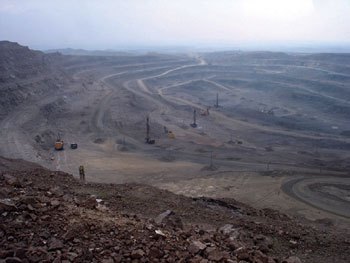Remember the Oil Crisis? Get Ready for the Chinese Dysprosium Crisis

Now we know why China is at the forefront of alternative energy propulsion:
For oil, China is at the mercy of unstable places and easily disruptable shipping routes. The Middle Kingdom is the second-largest oil consumer in the world (behind the United States). China imports about half of its oil, making it the third-largest net oil importer in the world behind the United States and Japan.
When it comes to dysprosium and terbium, China is in a much better position, called a quasi-monopoly.
China is getting quite possessive with the stuff. “China said supplies of dysprosium and terbium, minerals needed to make hybrid cars,” writes Bloomberg, “may be inadequate for its own needs, adding to concerns that the largest producer of rare earths may further cut exports.”
Dysprosium and terbium are rare earths. Rare earths are called rare earths because they are, well, rare on the earth. “The rest of the world has become a little concerned” about possible export bans from China, said Judith Chegwidden, managing director at London-based Roskill Information Services Ltd, an industry research group. “Dysprosium is increasingly used in hybrid cars like Prius or wind turbines. Demand is growing fast.”
China’s government started to curb output and exports in 2006. China may stockpile the rare dirt in a strategic reserve. Chinese exports of rare earths fell 35 percent in 2008 from 53,300 tons in 2006, all the while demand grows in areas of military defense, missiles, electronic information and green energy. China needs 70,000 tons of rare earths a year. They already cut 2009 output quotas of rare earths by 8.1 percent. They also encourage their industrialists to export processed products rather than just shipping the rare dirt abroad. Liang Shuhe, deputy head of foreign trade at the Ministry of Commerce said his government would “encourage exports of high value-adding, high-end products instead of the raw materials.”

Bertel Schmitt comes back to journalism after taking a 35 year break in advertising and marketing. He ran and owned advertising agencies in Duesseldorf, Germany, and New York City. Volkswagen A.G. was Bertel's most important corporate account. Schmitt's advertising and marketing career touched many corners of the industry with a special focus on automotive products and services. Since 2004, he lives in Japan and China with his wife <a href="http://www.tomokoandbertel.com"> Tomoko </a>. Bertel Schmitt is a founding board member of the <a href="http://www.offshoresuperseries.com"> Offshore Super Series </a>, an American offshore powerboat racing organization. He is co-owner of the racing team Typhoon.
More by Bertel Schmitt
Latest Car Reviews
Read moreLatest Product Reviews
Read moreRecent Comments
- Jkross22 When I think about products that I buy that are of the highest quality or are of great value, I have no idea if they are made as a whole or in parts by unionized employees. As a customer, that's really all I care about. When I think about services I receive from unionized and non-unionized employees, it varies from C- to F levels of service. Will unionizing make the cars better or worse?
- Namesakeone I think it's the age old conundrum: Every company (or industry) wants every other one to pay its workers well; well-paid workers make great customers. But nobody wants to pay their own workers well; that would eat into profits. So instead of what Henry Ford (the first) did over a century ago, we will have a lot of companies copying Nike in the 1980s: third-world employees (with a few highly-paid celebrity athlete endorsers) selling overpriced products to upper-middle-class Americans (with a few urban street youths willing to literally kill for that product), until there are no more upper-middle-class Americans left.
- ToolGuy I was challenged by Tim's incisive opinion, but thankfully Jeff's multiple vanilla truisms have set me straight. Or something. 😉
- ChristianWimmer The body kit modifications ruined it for me.
- ToolGuy "I have my stance -- I won't prejudice the commentariat by sharing it."• Like Tim, I have my opinion and it is perfect and above reproach (as long as I keep it to myself). I would hate to share it with the world and risk having someone critique it. LOL.


































Comments
Join the conversation
Well, to know whether (population) growth can last forever, we must first know if the total mass of the accessible universe is growing or not. This, so far, has been in the realm of theories only. But I am willing to bet the growth cannot last forever. If the universe is not growing, of course the population cannot grow forever. If the universe is indeed growing, then we may have a theoretical chance, but still may not have the time to migrate to other planets or galaxies before ours is doomed.
Humans (not to trivialize, really), are an equivalent to a 'cancer' on the earth - once the cancer gets too big, the host dies. Sorry for the downer.